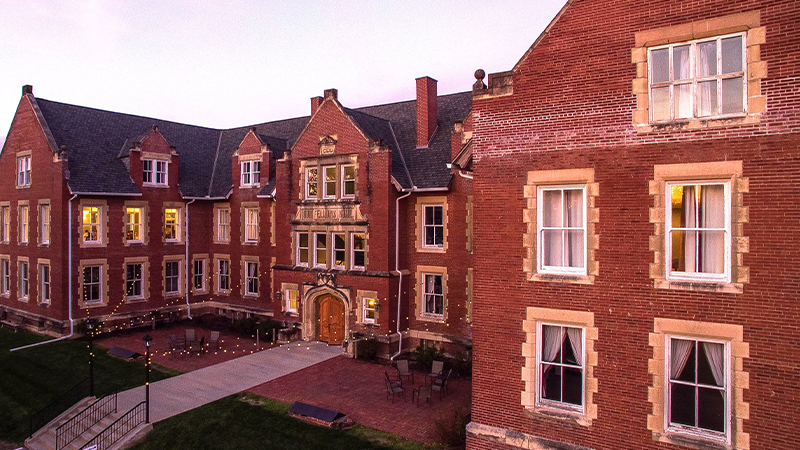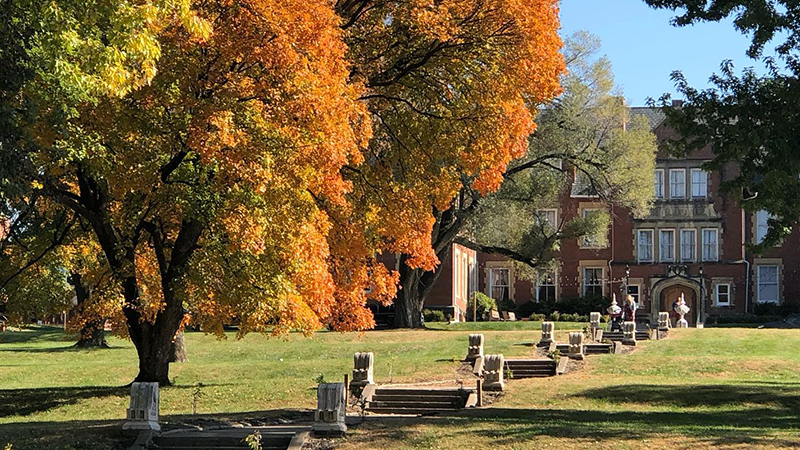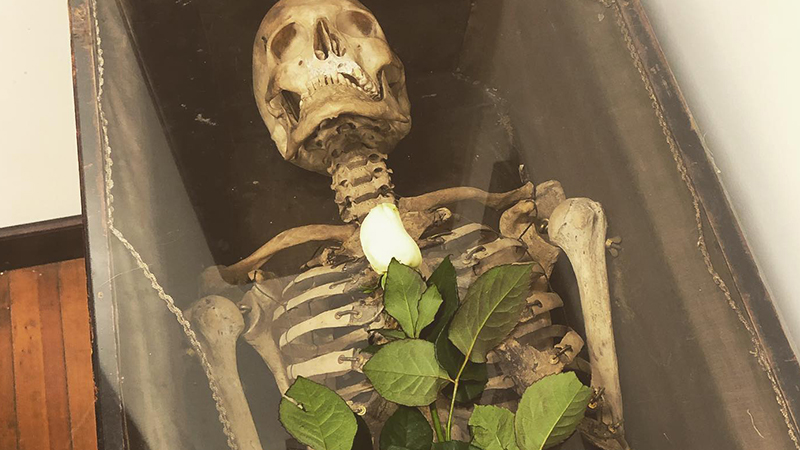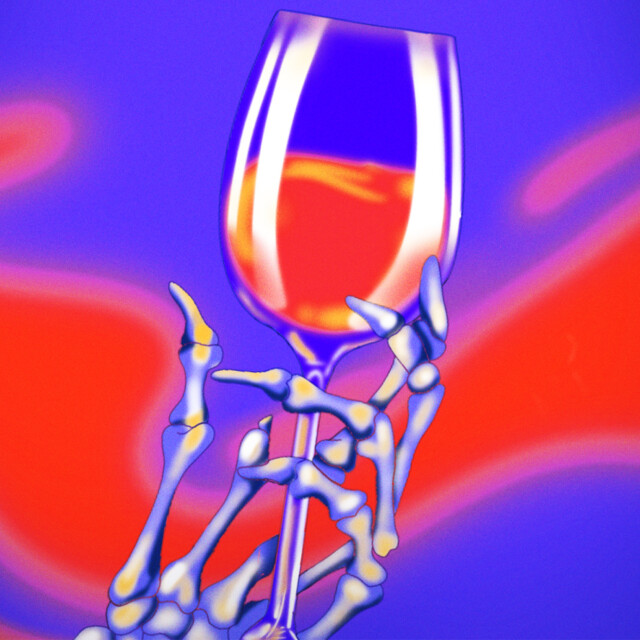When you go through the gates and up the long driveway to Belvoir Winery and Inn, at first all you’ll see is an old brick building, an illuminated terrace, and a double door entryway.
Turn to the left, and you’ll have a different view: decaying structures, more than a century old. Just up the hill, a cemetery with nearly 600 time-worn headstones overlooks a block of grape vines. Ask almost anyone who’s visited and they’ll tell you the same thing. The whole place is full of ghosts.
“I was there at night, there was nobody else there, and I heard a loud slam in the hallway,” says Belvoir CEO Jesse Leimkuehler. “I went out in the hall assuming someone was out there, but there was nobody. … The weird part is that there was another slam on the third floor just a minute later, but the cameras didn’t catch anything.”
Belvoir Winery and Inn, in Liberty, Mo., just outside of Kansas City, used to be a facility for the International Order of Odd Fellows, a fraternal organization that guaranteed care to its members in good standing in the early 1900s. Over a century later, the winery and guest rooms are in what used to be the orphanage and school. The buildings that haven’t been renovated yet used to be a hospital, an old folks home, and a nursing home with a morgue in the basement. It’s widely believed — by both believers in the paranormal and many skeptics who have visited and experienced unexplained things — that many of those residents never left.
The tasting room, in particular, is the setting for a lot of activity. “I had an event coordinator who was closing down for the night,” Leimkuehler explains. “She had turned off the lights in one area, and when she went back into the tasting room, she saw the lights were back on. She went back in thinking she had just forgotten to turn them off, turned them off again, came back into the bar a second time and looked back and the lights were on again.”

But dealing with spirits has become somewhat commonplace. “She basically went into that room and said, ‘You know, I’m not sure who’s here and not sure what you’re doing, but I’m trying to close. You need to leave the lights alone.’ And she turned them off and went back and the lights didn’t go back on the rest of the night,” Leimkuehler says.
The place has such a reputation for being haunted that paranormal enthusiasts regularly travel there to investigate, and shows like “Ghost Hunters,” “Kindred Spirits,” and “Ghost Adventures” have filmed there. In the guest rooms upstairs, each named after one of Belvoir’s wines, there are guest books where people detail the unexplained things they’ve seen and heard.
“Even though it’s really, really haunted and yes, people do routinely leave in the middle of the night because they’re terrified, I find it to be a very welcoming space,” says Amy Bruni, paranormal researcher and co-host of “Kindred Spirits.” Every year, Bruni hosts an investigation weekend at the complex with her paranormal travel company Strange Escapes. She’s experienced phenomena like pianos playing with no one near them, the sounds of furniture being moved when nothing has been touched, and the whispers and giggles of kids in empty rooms. Children’s voices are most common in that building because that’s where they lived. “It’s really active in that area,” she adds, “probably more so than other areas on the property.”
“If you were to go there and not know that it’s haunted or didn’t believe in ghosts, you might change your mind after a weekend.”
Belvoir makes wines using primarily Missouri grapes. The state might not be top of mind when it comes to American wine production, but it actually has a rich viticultural history. The first AVA ever designated was in Missouri in 1980, but the story starts a lot earlier than that, when German immigrants started planting European grapes in the area. When phylloxera was decimating rootstock in France, Missouri was one of the first places to graft onto American plants and played a huge role in preserving those varieties.
Among Belvoir’s wines is its signature Norton, a dry, full-bodied red made with Missouri’s official state grape of the same name, grown on the property. Others are the medium-bodied Casanova, a blend of Missouri Chambourcin and St. Vincent grapes with California Syrah; and a lighter red called Lucky Pierre, made with Concord, St. Vincent, and Chambourcin. They also make three white blends, a rosé, and this year released a line of sparkling wines under their new Belvoir Three Graces label.

“If you were to go there and not know that it’s haunted or didn’t believe in ghosts, you might change your mind after a weekend,” says Adam Berry, co-host of “Kindred Spirits” and author of “Goodbye, Hello: Processing Grief and Understanding Death Through the Paranormal.”
The buildings on the property were constructed from 1900 to 1935, and during the Great Depression, there were more child residents than adults, in large part due to impoverished families surrendering their kids to the Odd Fellows so that they would have better care and regular meals. That the kids were well fed and cared for — and were, overall, happy with the Odd Fellows — is one theory why the paranormal activity tends to be more playful and mischievous in the orphanage. In places where people, even kids, weren’t treated as well, like the Ohio State Reformatory or the Old Charleston Jail, the activity can be more aggressive or malicious.
“The main things we have happen in that building are usually just fooling around or trying to get attention,” Leimkuehler says. “We’ve had tablets fly off the counter, doors open and close. We hear voices in the hallway by the tasting room, usually children’s voices, that sound like a conversation. Then when you go to explore to figure out what’s going on, there’s nothing out there.”
“There’s a shadow figure that lurks behind the tanks,” he says. “I’ve seen them peek out around there. Sometimes if you’re back there by yourself, you feel like you’re being watched.”
One person who’s always there, though, is George — the human skeleton on display in the winery’s room of Odd Fellows artifacts. Each lodge had a skeleton, all named George, used in their secret initiation ceremony as a reminder that everyone dies and an imperative to treat people well during life. This one is the remains of a member who donated his skeleton to the order in the 1880s, which the winery acquired from a lodge that was closing.
“We thought, if he can’t stay there, at least he can be in a place where there’s Odd Fellows” Leimkuehler explains. “We brought him back, and he’s become part of the family. We don’t treat him like a skeleton, we treat him like a person.”

When there are weddings on the property, Leimkuehler says, “it’s become a good luck charm to give George flowers on your wedding day. When staff goes in to turn on or turn off the lights, they always say, ‘Hello George’ or ‘Have a good night, George.’”
While the tasting room is in the orphanage building, the production facilities are in a building on the property that was occupied by adults — and Berry has encountered one there before who left an impression. “There’s a shadow figure that lurks behind the tanks,” he says. “I’ve seen them peek out around there. Sometimes if you’re back there by yourself, you feel like you’re being watched. You feel that there’s somebody back there surveying the area and what you are doing specifically. To see something peek around the corner, or to see a shadow move or hear footsteps, it just creeps you out.”
Leimkuehler characterizes the kind of activity that comes from adult spirits on the property as more serious, as though they’re communicating that they want to be left alone.
“That’s the nursing home area,” he says, “so we tend to have grumpy spirits there, for lack of a better description. I don’t think they’re malicious by any means, but I do think they’re just not really happy we’re there. It’s a different sort of vibe.” That building isn’t open to the public unless it’s part of a paranormal investigation.
But still, even if you do go poking around in the dark there, you’re not likely to find anyone who’s trying to scare you.
“It’s a beautiful location that serves a purpose for the community,” Berry says. “It’s a gathering place. Wine brings everybody together and you know, you may get some unexpected spirits in the mix.”
